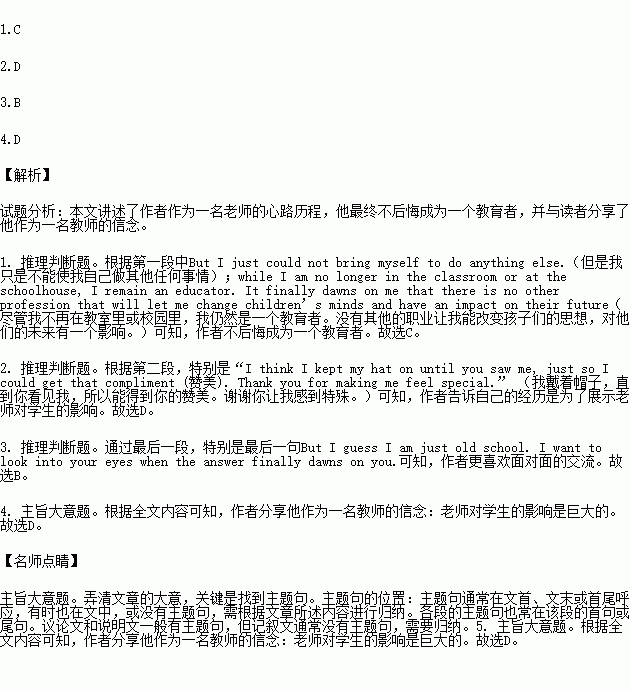题目内容
In the spring of my career, I found myself questioning the choice of my life’s work. The students did not appear to be motivated; the paperwork was overwhelming (巨大的) and the constant changes of educational direction were discouraging. But I just could not bring myself to do anything else. “Next year,” I would say, “next year I will switch jobs, make more money and have far less stress.” Next year just never came. I am now in my forties. And while I am no longer in the classroom or at the schoolhouse, I remain an educator. It finally dawns on me that there is no other profession that will let me change children’s minds and have an impact on their future. For every student that finally “got it”, for every new teacher that said, “You inspired me to stay,” I get the raise that has never quite made it to my paycheck.
I was on a plane recently and the flight attendant asked my name. When I told him, he said, “I knew that was you! You taught at my elementary school. You made me take my cap off in the building and told me I was handsome.” He then paused and said, “I think I kept my hat on until you saw me, just so I could get that compliment (赞美). Thank you for making me feel special.”
We have now entered an age where nothing is private and secrets are hard to keep. Your “friends” are counted by simply clicking a button. Face-to-face interactions are seen by many as unnecessary and time-consuming. Of course, we can do anything online, including teaching and learning. But I guess I am just old school. I want to look into your eyes when the answer finally dawns on you.
1.From the first paragraph, we can learn that the author ________.
A. never wanted to change the job
B. wasn’t a success as a teacher
C. doesn’t regret being an educator
D. was not happy with her paycheck
2.The author told us the experience in Paragraph 2 mainly to show ________.
A. feedback on teachers’ classes from students
B. the friendship between teachers and students
C. an important role praise plays in people’s life
D. the great influence teachers have on students
3.What can we infer from the last paragraph?
A. The author is out of fashion in today’s world.
B. The author still prefers face-to-face communication.
C. The author thinks online communication is boring.
D. The author suggests that people stay away from the Internet.
4.What could be the author’s purpose in writing the text?
A. To make a summary of her teaching career.
B. To express her views on the Internet.
C. To show the influence of a teacher.
D. To share her belief as a teacher.

